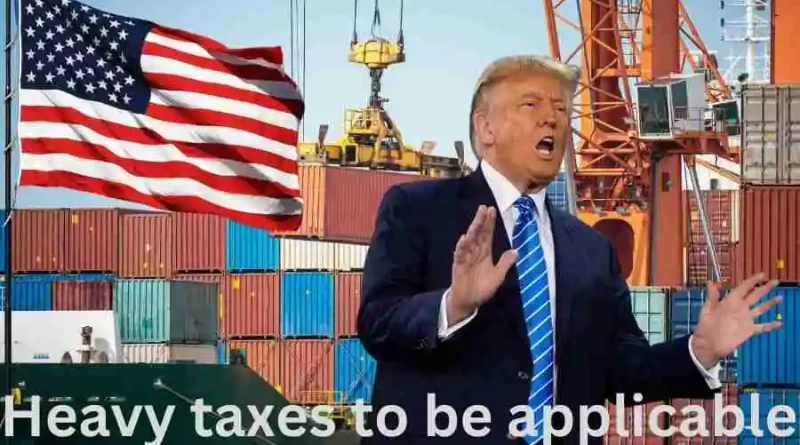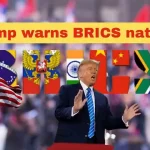Donald Trump announces hefty taxes on goods from Mexico, Canada and China
Move to curb the rising menace of drugs and crime in the country
In what is termed a retaliatory move by Trump, heavy taxes are anticipated on the goods to check crime and drug scenarios emerging from Mexico. And in the ambit, come two more nations, Canada and China. The move is seen to prove costly for many Americans, especially businesses and consumers.
These measures are said to start right from day one, as per President-elect Trump.
“This tariff will remain in effect until such time as drugs, in particular fentanyl, and all illegal aliens stop this invasion of our country,” posted Trump on his Truth Social platform. “On January 20th, as one of my many first executive orders, I will sign all necessary documents to charge Mexico and Canada a 25% tariff on ALL products coming into the United States, and its ridiculous open borders.”
Trump also added in the same vein that the country’s neighbors can easily solve this long-simmering problem.
Hefty taxes due to The China conundrum
The illegal flow of drugs from China is yet another problem that the US faces and the Trump administration is very clear about how it’s going to deal with that. On his web platform, he said that he will levy higher taxes on the goods originating from China by above 10%, till the latter takes some action in this regard.
Claiming about the absence of any solid step from the Chinese side, Trump said, “I have had many talks with China about the massive amounts of drugs, in particular fentanyl, being sent into the United States—but to no avail.”
The president-elect further added that Chinese officials promised him the country would execute drug dealers caught funneling drugs into the United States but “never followed through.”
“About the issue of US tariffs on China, China believes that China-US economic and trade cooperation is mutually beneficial in nature. No one will win a trade war or a tariff war,” Chinese Embassy spokesperson Liu Pengyu said in a statement. While talking to the reports from a reputed news channel, Liu said, “The idea of China knowingly allowing fentanyl precursors to flow into the United States runs completely counter to facts and reality.”
According to the Embassy spokesperson, China was in touch with America regarding the counternarcotics operations upon being asked about the Trump announcement by the news reporters.
Meanwhile, Canada and Mexico were contacted by the above news channel for their views.
Canadian Public Safety Minister Dominic LeBlanc and Deputy Prime Minister Chrystia Freeland, in a joint statement, said, “We will of course continue to discuss these issues with the incoming administration.”
Posting to X on Monday, Canadian officials replied with an official statement that their nation “places the highest priority on border security and the integrity of our shared border” and is “essential to US domestic energy supply.”
Upcoming American policy misdirected?
The unusual taxes are believed to be cost-heavy for America’s supply chains and industries, which are dependent upon goods from the countries the US is currently trading with. As such, the markets there have been affected, whereas investors still had faith in the strengthening of the American dollar.
Karl Schamotta, chief market strategist at Corpay Cross-Border Solutions, explained that “the measures proposed this evening could hit a number of strategic US industrial sectors hard, add approximately $272 billion a year to tax burdens, raise goods prices, lift interest rates, and sap strength in an already vulnerable household sector.”
Chinese yuan traded higher—above 7.6%—in offshore markets, despite tighter control from the country’s administration. The Mexican peso fell 2% against the dollar, whereas the Canadian dollar fell 1.2% against the US dollar as soon as the announcement from the upcoming US government came.
The United States-Mexico-Canada Agreement (USMCA) replacing the North American Free Trade Agreement (NAFTA) has often been highlighted by Trump as part of his political victory. Semantics apart, it is but a fact that an average American is going to bear most of the financial brunt in terms of overall price rise.
Proposed taxes: A reality check
On the face of it, the proposed taxes appear to be yielding beneficiary results, but the economists believe otherwise. And they have a reason too! According to the Peterson Institute for International Economics, it is being surmised that the increased tariffs will make any US household spend over $2,600 a year. Being inflationary, the tariffs end up hitting the domestic companies the most, and an overall cost has to be borne by the consumers in the US, as companies have to include those tariffs in the goods’ price.
Therefore, increased taxes on imported goods indirectly hit the commoners’ the most. Also, the main point of levying taxes on imported goods, thereby increasing domestic manufacturing, falls flat on the face.
Increased taxes have been proposed by the Trump government to take a hit on the foreign nations, like he did that during his first term, as well as pay for the lacunae the proposed tax cut plan will create. But unlike anything, these steps are sure to be on a rebound trail! In the first term of Trump, the same thing happened when tariffs were increased. Trade wars follow often as part of retaliation by the affected nations and an overall positive result for the domestic manufacturers loses its sheen.
Whatever the outcome, the president-elect will surely have his way with his promise of yet larger tariffs. Despite a wavering guess about an exact taxes cut on all Chinese goods, on imported goods from other countries, these will hover around 60% and 10% to 20% an across-the-board tariff. Trump’s upcoming Treasury secretary, Scott Bessent, is of the view, however, that the increase tariffs won’t be inflationary if implementation is done correctly.








